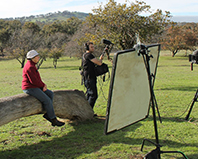Read the latest information on
Foot-and-mouth disease

Film crew setting up for the interview with Donna Reid from Binalong.
For John Schooneveldt and his partner Donna Reid (pictured seated, left), biosecurity is woven into everyday life at their goat property outside Binalong, in southern NSW.
The couple have raised cashmere goats on their 107-acre property for the past 20 years and over this time have integrated biosecurity practices with their daily operations in order to capitalise on the benefits of raising healthy livestock and avoiding diseases, pests and weeds.
In a one-on-one interview, filmed as part of the latest Farm Biosecurity video – Production Practices – currently in production, Donna remarked that with a quality animal, they’ll have quality fibre and quality meat and this is their main aim – great quality product.
“To start with, when we bring any animals onto the property, we are always concerned that they do not bring any diseases with them, so we have a quarantine paddock, close to the front gate and that’s where the newly introduced animals go until we are happy that they are healthy and emptied out,” said Donna.
“[Quarantining] also gives us the chance to look the goat over and identify any problems that might come up,” Donna said.
Donna also highlighted how they implement routine, but casual, monitoring into their everyday lives.
“We are out and about, walking, looking at the goats all the time and if we see anything that’s problematic we will go straight into action,” Donna said.
Other simple, cheap, yet very effective practices Donna and John employ include:
For John and Donna, employing biosecurity measures are a logical business move, as they provide a simple way to boost production and avoid the expensive outcomes that can accompany livestock diseases, pests and weeds.
All producers can take similar actions on their properties, easily and simply, and in doing so will help prevent the costs associated with disease and pest incursions on their properties.